|
Party Time
The London Season – that hectic social whirl climaxing just before Christmas when everyone in crime fiction publishing takes a well-earned six week holiday to prepare themselves for their month-long skiing holiday in February – began in September with the traditional Francis launch party. Of course these days it is Felix Francis, rather than his late father Dick, who hosts this spectacular event, now held in the splendour of the Lansdowne Club.

Sadly, I was unable to attend this year and it fell to Shots editor Mike Stotter to act as my locum at the launch of Felix’s new novel Refusal. I was, however, determined not to miss that other regular date on the social calendar, the launch of the latest Martina Cole novel. This year’s novel, her twentieth, is Revenge (out now from Headline) and the setting for the launch was the spectacular Pompadour Suite at the Café Royal.
Publishers often (too often) hype a new book with the label “bestseller” before publication, but with a Martina Cole they are always absolutely accurate. I suspect it was climbing the best seller charts even before the last champagne cork had popped.
It is always a pleasure to see Martina, who seems busier than ever with various projects though still finds time to promote literacy in HM Prisons, and her parties are a wonderful opportunity, for a country mouse such as myself, to catch up with the movers and shakers on the London scene.
 |
 |
Naturally no social event is complete without millionaire playboy Prince Ali Karim, proudly sporting a hat loaned to him by Walter Mosley for some unknown reason. It was also a delight to run in to Michael Anderson, the proprietor of Gerry’s Club in nearby Soho. Michael has long been a staunch supporter of crime fiction and his club has offered a haven of peace and tranquillity for many a crime writer worn out from trudging the streets of the Great Wen, bent double under the weight of rejected manuscripts. Although I now qualify as a ‘country member’, as I suspect does Martina, we are both fiercely proud of our membership of Gerry’s over the last two decades and it is the only London club I allow to be listed in my Who’s Who entry.
 |
It was a surprise, but a pleasant one, to meet the mysterious Vina Jackson, whose identity is a closely-guarded secret, the author of six novels for Orion in the 80 Days series, which I discover has nothing whatsoever to do with Phileas Fogg or Michael Palin but are in fact ‘erotic romances’. I cannot explain the significance of ’80 Days’ except that it is probably more catchy than 11½ Weeks (not to mention a fortnight longer than 9½ Weeks) and most of the titles have a colour attached to them such as 80 Days Red, 80 Days Amber and so on, and the German editions concentrate on this, labelling this best-selling series as Die Farbe der Lust.
I have to admit that the runaway success of the 80 Days series had eluded me until I met Vina Jackson (and isn’t ‘Vina’ the dog Latin for ‘I have come’?) but one has to applaud the stamina involved in producing six 300+ page novels in a year. That’s one every two months, or one every 8½ Weeks, which is quite a schedule and not one I could keep up.
After only the briefest of respites, crime fiction’s great and good descended upon fashionable Belgravia for a reception at the Icelandic Embassy and a preview of Iceland Noir – the country’s first festival of crime fiction which takes place in Reykjavik on 21-24 November.
If the Reykjavik festival exhibits only half the excellent hospitality shown by Iceland’s London embassy, I predict it will be a great success and while Iceland aims to claim a place in the current boom in Nordic crime writing, I could not pass up the opportunity to discuss The Vinland Sagas which not only recount the Norse discovery of America around the year 1000 but tell the story of Freydis, possibly America’s first female mass murderer!

As the original author(s) of the sagas could not be with us, the Icelandic Ambassador, His Excellency Mr Benedikt Jansson, kindly signed my Penguin Classics copy. Yet is was the Icelandic Deputy Head of Mission, crime-fiction fan and former policeman Axel Nikulásson (pictured below with Daniela Petracco of Europa Editions UK) who raised a very interesting point. Freydis’ story is a bloodthirsty tale of violence, greed and cover-up that it really is quite amazing that Hollywood hasn’t made a film of it yet.

No doubt concerned with more contemporary crime fiction, I spotted among the star-studded guest list my legal adviser Marcel Berlins and his vivacious wife Lisa exchanging light-hearted banter with author Michael Ridpath (whose Icelandic take on The Lord of the Rings in his 2010 novel Where the Shadows Lie was highly recommended by this column).

And in equally jovial mood, I found CADS Magazine editor Geoff Bradley deep in conversation with Dolores and Maxim Jakubowski, once – many years ago in the last century – my co-editor on the Fresh Blood series of anthologies.
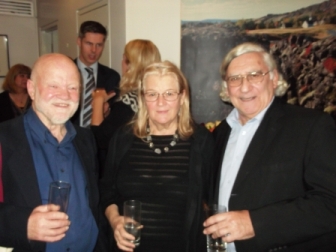
Tartan Norge
If you ever needed proof that crime fiction was a cosmopolitan business, I refer you to Closed For Winter by Jorn Lier Horst, a lead title for Sandstone Press, which is a new name (to me) in publishing.
Written by a Norwegian policeman, translated by a resident of the Isle of Arran, designed in Glasgow, printed in Poland and with a cover blurb from Professor Barry Forshaw, Chair of Nordic Noir at the University of Islington, this seems a commendable example of pan-European co-operation.
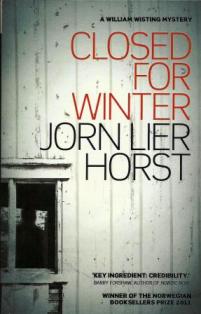
One thing does slightly puzzle me, though. Sandstone Press, based in Dingwall in the north of Scotland and fittingly reputed to have been the capital of Viking Scotland, certainly produces fine books, both fiction and non-fiction and even specialises in Gaelic titles. And whilst their crime output (which includes American T. Jefferson Parker) is not exclusively Scandinavian, Jorn Lier Horst – a bestseller in Norway and “immensely impressive” according to Professor Forshaw – is clearly an author in whom they are investing.
Quite why this publication needs the subsidy it openly acknowledges from the arts-funding public body ‘Creative Scotland’ is a bit of a mystery. I suppose it must be that Scandinavian crime fiction, despite Professor Forshaw’s best efforts, is such a delicate flower that it needs all the nurturing it can get, although I am sure cynics would feel that a better use of public money might be to encourage a more domestic crime writing tradition. Just think of it – school of Scottish crime writing. It’s not beyond the bounds of reason you know, and some wag would almost certainly call it ‘Tartan Noir’. I will have to ask some of my contacts north of the border in the McIlvaney, Brookmyre, McDermid and Rankin clans what they think of the idea.
Famous Belgians
I have to admit that for a long time, I had a problem with Georges Simenon, despite many recommendations from writers and readers whose views I respected. I was put off the first of his Maigret books I tried (all written in the 1930s) by flashes of casual anti-Semitism in the writing. Of course he was far from alone in this at the time, but in one novel he referred quite coldly to “Jews arriving by the train load”. It was an unfortunate and cruelly prophetic turn of phrase referring to refugees fleeing from Nazi Germany trying to find sanctuary in France.

And I know – because the Daily Mail has taught us – that one should never condemn a man through his family members, but I was further put off the Simenon brand when I learned that his brother was, allegedly, a key member of the Rexists, the Belgian fascist movement during the war. However, years later I did try again and found much to admire in his post-war Maigret stories of the 1950s and now I may be able to fill in yet more gaps in my crime fiction education as Penguin Classics are about to embark on a massive project: the reissuing of all 75 Maigret novels in new translations.
I will be interested to see if the new translations of his early novels have softened my original reservations as the series starts, chronologically (one title a month) with Pietr the Latvian, The Late Monsieur Gallet and The Hanged Man of Saint-Pholien.
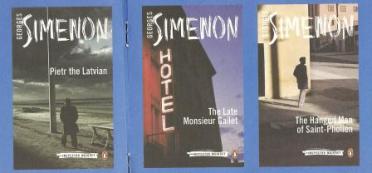
These titles are, I believe, from 1931-32, and may well have appeared in English previously as The Strange Case of Peter the Lett, Maigret Stonewalled and Maigret and the Hundred Gibbets, though I am no Simenon expert. I do know, however, that many of his hardback titles when published in the UK in the 1950s and early ‘60s, such as The Blue Room (below) had dust-jackets designed by Pip Youngman Carter, husband of Margery Allingham and author of two Albert Campion novels in his own right.
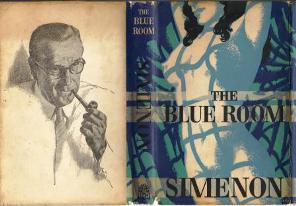
And I cannot mention Margery Allingham – in this the 25th anniversary of the Margery Allingham Society – without highlighting the splendid short story competition being run in conjunction with the Crime Writers Association.

Full details of the competition, which is open until March 2014and carries a £1,000 prize, can be found on http://www.thecwa.co.uk/ShortStory/index.php.
The Rewards of Fandom
Whilst most normal people with humdrum lives spent September doing their regular Michaelmas chores (bringing in harvests, hewing wood for winter, collecting tithes and setting tenants’ rents for the coming year), millionaire playboy Prince Ali Karim was, as usual, globe-trotting and on a visit to the colonies picked up the Donald Sandstrom Memorial Award presented by that excellent magazine Deadly Pleasures.

The award, ‘For Lifetime Achievement in Mystery Fandom’, was made at a lavish breakfast banquet where the honour of sitting at Prince Ali’s right hand was given to the prolific mystery writer Lawrence Block. As always, Ali breakfasted on his customary half-litre of champagne and had obviously regaled his guest with so many bloodthirsty tales of his life of fandom that poor Mr Block quite lost his appetite.

St Crispin’s Day
Last month’s little competition to win three Edmund Crispin titles (the answer, by the way, was Carry On Nurse, for which Crispin, under his real name, wrote the music score) attracted entries – all correct – from as far afield as Chelmsford and Finland. Most pleasing of all were the large number of entrants who did it just for the fun as they already had all Crispin’s books and indicated that if they won, the prize should go to someone who had not read them. As it was, the first name out of the electronic hat was T. Prentice of Stratford on Avon.
Autumn Leaves
Each year Nottingham-based publisher Five Leaves produces an anthology on a general theme, and this year that theme is Crime. Whilst several well-known names in crime fiction feature among the contributors – including John Harvey, Cathi Unsworth and Danuta Reah – this is not a collection of short stories, but a series of wide-ranging essays. Two in particular caught my eye.
Anyone who attended the Shot in the Dark conventions in Nottingham in the 1990s (I still have the t-shirt) should remember that ebullient film-maker and scriptwriter Michael Eaton. In Crime he writes about his fascination with Victorian criminal-turned-folk-hero Charles Peace who also, it appears, fascinated writers including Conan Doyle, E.W. Hornung, Mark Twain and Edgar Wallace. The “rapacious Robin Hood” (or “Vile Victorian” depending on your point of view) clearly inspired Michael Eaton enough to write the musical melodrama Charlie Peace; His Amazing Life and Astounding Legend, which has just finished a short run at the Nottingham Playhouse and starred Peter Duncan (of Blue Peter fame) and my old chum Norman Pace (once sadly mis-cast as Peter Pascoe in Yorkshire Television’s abortive attempt to bring Reginald Hill’s Dalziel and Pascoe novels to the small screen).
Regretfully I was unable to take in Michael’s new show, though I hear it was quite delightful, as, after six years attending Shot in the Dark conventions, I was told by the city authorities that perhaps I had come to Nottingham once too often…
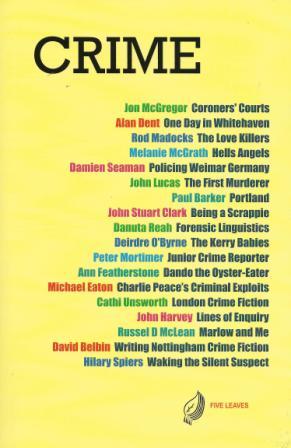 Crime also contains an interesting essay by John Harvey entitled ‘Lines of Enquiry’ in which he gives us his thoughts on the origins of the contemporary British crime novel. Interestingly, he postulates that the ‘fundamentally conservative tradition of the so-called Golden Age…..was so all-pervading’ that the influence of the American hard-boiled school was kept at bay until well after WW2. John admits that ‘Expert commentators such as Barry Forshaw and Mike Ripley might be able to point to examples that would shoot a few ragged holes in this argument...’ Crime also contains an interesting essay by John Harvey entitled ‘Lines of Enquiry’ in which he gives us his thoughts on the origins of the contemporary British crime novel. Interestingly, he postulates that the ‘fundamentally conservative tradition of the so-called Golden Age…..was so all-pervading’ that the influence of the American hard-boiled school was kept at bay until well after WW2. John admits that ‘Expert commentators such as Barry Forshaw and Mike Ripley might be able to point to examples that would shoot a few ragged holes in this argument...’
Well, once I have recovered from the head-spinning euphoria of being mentioned in the same sentence as Professor Barry Forshaw, I will have to give the matter some serious thought. For the moment, I shall retreat to a darkened room and apply a cold compress to my forehead.
|
|
To Be Continued…
There is something of a boom nowadays in what is known as ‘Continuation Fiction’ where favourite characters from the past are revived for fresh adventures under new authorship. It just goes to prove that a good character is a difficult thing to create and really good ones deserve a life beyond that of their creator, if the ‘continuation’ is done with true affection for the original.
Jill Paton Walsh has already proved (three times) that the mantle, or ermine-collared gown, of Dorothy L. Sayers rests quite comfortably around her shoulders. Next month she does it again, with her fourth Lord Peter Wimsey mystery, The Late Scholar, from Hodder.
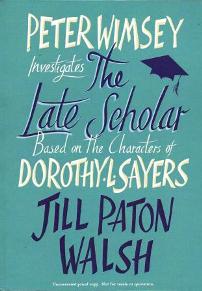
In the ‘Paton Walsh Era’ – if one may call it that – Peter Wimsey is no longer a mere Lord but the fully-fledged (if occasionally reluctant) Duke of Denver and the time period is now the early 1950s. Fortunately, His Grace has not lost the knack of sniffing out skullduggery, especially not in that hotbed of villainy, Oxford University. Finding himself the official ‘Visitor’ of St Severin’s College, Wimsey is called in to settle a dispute between the college’s senior staff who are divided on the issue of whether or not to sell a thousand-year-old manuscript in order to balance the books. Naturally, Peter’s wife, detective novelist Harriet Vane, accompanies him and the pair investigate the series of assaults and ‘accidents’ which have befallen the college Fellows.
In a sly piece of homage, the methods of intimidating the Fellows bear a suspicious resemblance to the methods of murder involved in Lord Peter’s previous adventures, though any dedicated reader of Sayers will have twigged this, with great pleasure, by the end of Chapter Three.
But Lord Peter is not the only ‘Golden Age’ detective to be subject to revival in the coming months. Perhaps the most famous of them all, Agatha Christie’s Hercule Poirot, gets to exercise his ‘leetle grey cells’ again in a new novel, due next September, penned by my chum the admirable Sophie Hannah.
 
And here I must declare an interest as March 2014 will see the return, after a brief hiatus of about 44 years, of Margery Allingham’s famous hero Albert Campion in Mr Campion’s Farewell, published by Severn House and authored by ... well, er … me, actually.
With the co-operation of the Margery Allingham Society, I have completed the untitled third novel by Pip Youngman Carter, Margery’s widower, left unfinished on his death in 1969. It is quite likely that I will be referring to this title at every given opportunity in the coming months.
The most prolific ‘continuation’ character after Sherlock Holmes is probably James Bond, who has appeared now in (I think) 33 continuations and I am told that a new one, Solo by William Boyd is out now, although I have not been allowed to see a review copy.

Interestingly, Sebastian Faulks, himself a Bond continuation author, has now turned his continuation skills to characters created by P.G. Wodehouse and his new novel Jeeves and the Wedding Bells appears this month.
But the most anticipated continuation among crime-writing aficionados must surely be The Black Eyed Blonde by Benjamin Black, which is due from Mantle in 2014.

There will be many crime fans chomping at the bit to read this new novel featuring Raymond Chandler’s iconic private eye Philip Marlowe and many will be wondering whether Benjamin Black found it easier to produce than the proper fiction he writes under his real name of John Banville, though of course he is not the first to try and take on the Chandler legend. Back in 1989 Robert B. Parker (who knew a thing or two about private eye stories) had a go at completing the unfinished Marlowe story Poodle Springs, with not – as far as I remember – the happiest of outcomes. And because what goes around tends to come around, Robert B. Parker’s Spenser series is itself being continued by American Ace Atkins and whilst I am told at least one volume has been published in the UK, for legal reasons I have not seen it.
Out Now
What with all the publishers’ parties coming up, not to mention the festivities at Saturnalia, there is hardly time to read anything; but of course one does make time, usually by neglecting one’s family and other animals. This month there are some splendid reads around and a quick round-up like this can barely do them justice.
Although not a crime novel, For A Mother’s Sins by Diane Allen, from Pan Macmillan, is a Victorian saga which, I am assured, contains at least one violent death.

It is a book many in the crime fiction business should be interested in as not only was Diane’s debut novel something of a best seller last Christmas, but in her ‘day job’ with Magna Large Print, she has done much over the years to support and promote crime novels and crime writers, especially in public libraries.
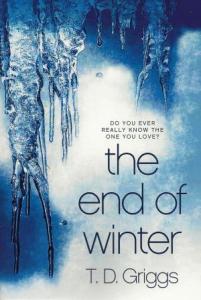
It’s also good to see one of Tim Griggs’ international bestsellers now available more easily in the UK. The End of Winter was originally published in Germany in 2004 and has reappeared thanks to Amazon’s CreateSpace imprint. I have long since stopped worrying or trying to understand the publishing game but it does strike me as odd that a writer as accomplished as Tim Griggs should be far better known (and demonstrably commercial) in foreign markets than in his native UK.
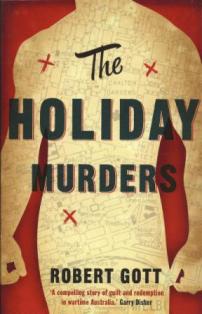
One of the freshest imprints on the London scene is that of Australian outfit Scribe, who are determined to spice up our groaning to-be-read piles with new authors, at least new to this country. The latest is Robert Gott, who already has a fine track record in children’s fiction and a series of ‘caper’ thrillers set in Australia during WWII. His new novel, The Holiday Murders, which has been nominated in the prestigious Ned Kelly Awards this year, also uses a wartime setting – Melbourne at Christmas, 1943 – but this is not a caper but rather a traditional murder mystery (written in a deliberately old fashioned style) with a fascinating and chilling, because it is accurate, background of neo-Nazism and anti-Semitism.
It is, amazingly, 32 years since Moscow policeman Arkady Renko made his debut in the Gold Dagger-winning thriller Gorky Park. In his most excellent eighth outing, Tatania, from Simon & Schuster, Arkady investigates the inter-connected deaths of a muckraking journalist, a billionaire gangster and a Swiss translator found shot on the Baltic coast near Kaliningrad.
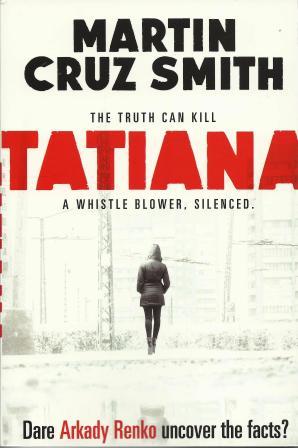
This is a first-rate crime thriller and, apart from a couple of Americanisms which seem out of place (‘soda’ for non-alcoholic drink and ‘thunderhead’ for cloud), totally convincing. Quite how Martin Cruz Smith manages to get the detail of life in modern Russia so right, whilst living in California, is a mystery but I’m very glad he does. Oddly, Martin Cruz Smith is one of those thriller writers whose name seems to slip under the radar in this country, though I cannot think why for his books are very, very good. Thankfully, Simon & Schuster are reissuing his entire backlist between now and May 2014 and if there are ‘new bugs’ out there who need a lesson in thriller-writing, they could do far worse than study Gorky Park, Havana Bay and Three Stations from his Renko series and his stand-alone novels Nightwing (for a touch of horror) and the superb Tokyo Station.
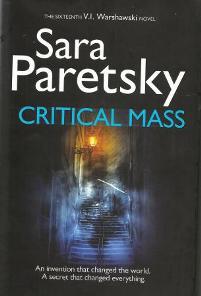
It is 31 years since Chicago gumshoe V.I. Warshawski made her debut in Sara Paretsky’s Indemnity Only but her sixteenth case, just published by Hodder & Stoughton, Critical Mass ranges way beyond the windy city to pre-war Austria and into the history of nuclear physics.
And in a tenuous segue on the pre-war theme, I can certainly recommend an Italian author new to me, Maurizio De Giovanni, whose novel Everyone In Their Place is, I believe, the first of his work to be translated into English and published by Europa Editions in their World Noir series.
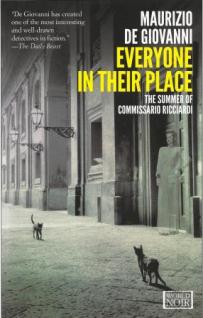
De Giovanni’s series hero is police detective Commissario Luigi Ricciardi, whose stomping ground is Naples. Other books in the series are subtitled ‘The Winter of Commissario Ricciardi’, ‘The Spring of…’ and so on. Everyone In Their Place is ‘The Summer of…’ but it’s by no means a restful summer as Ricciardi has to investigate the death of a Duchess with connections to the highest strata of Neapolitan society, not to mention the local Fascist elite as this is Naples in 1931 – and Benito Mussolini is about to make a state visit to the city. I hope we get the full series of Ricciardi books in English in due course, as he is an interesting (if a bit weird in that he has the ‘sixth sense’ which enables him ‘to see dead people’) central character at the Fascist Italy setting, with all its added complications for a dedicated policeman, is a stroke of genius.
And A Happy New Year
Even though we have not yet reached Bonfire Night (which will surely be fuelled this year by surplus copies of 50 Shades), publishers are already bombarding me with books scheduled for publication in 2014, much to the annoyance of my postman, who is now a shareholder and no longer to be trifled with. Several have caught my eye and have already been stacked in a holding pattern circling above my reading lectern.
January sees the publication of a new novel from Nick Stone and, it seems, something of a shift in style as, with The Verdict (from Sphere), Nick enters the cut-throat world of the legal thriller. The advance publicity hails it as ‘2014’s biggest legal thriller’ which is quite a big claim in 2013 and advises booksellers that ‘There is a gap in the market for a standout legal thriller’ which is a claim probably disputed by John Grisham, Michael Connelly, Scott Turow, Mark Gimenez, Lisa Scottoline and a host of American lawyers with light case loads. If however, the publishers were hinting that there was a gap in the market for a British legal thriller, then they could have a point. Either way, I know that Nick Stone is incapable of writing anything uninteresting so I shall follow this new turn in his career with interest.
 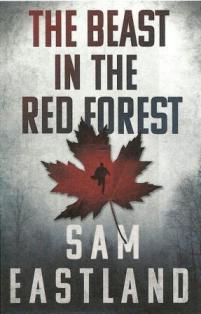
I have been a fan of the ‘Inspector Pekkala’ thrillers of Sam Eastland (aka Paul Watkins) since the series began four books ago. Now, despite the seemingly fatal cliff-hanging ending of the last one, Pekkala returns in The Beast In The Red Forest (Faber), set in Stalin’s Russia during WW2 at the height of the Nazi invasion.
Another firm favourite of mine is that uncrowned king of distopian American noir, Andrew Vachss, and he too has a new novel out in January, Urban Renewal which is published in the US by Vintage Crime/Black Lizard. After his trailblazing series of bleak and uncompromising novels featuring urban warrior Burke, Andrew is now embarked on a new series set around Chicago and the activities of ‘the Cross Crew’ of mercenaries.

In February, two books about which I know little but both of which have been recommended to me by people whose opinions I respect (so far).
Elliott Colla is an American and something of an expert on Middle Eastern affairs and Arabic poetry and literature. His debut novelBaghdad Central, published by the excellentBitter Lemon Press, is a mystery set in Iraq in 2003 just after the American invasion had been declared a “mission accomplished” by President Bush (I suppose, with great embarrassment, I should say ‘Anglo-American invasion’), with an Iraqi policeman as the central character.
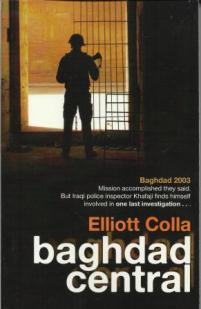 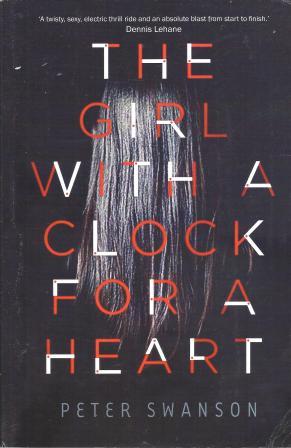
Another American debut in February comes with what the young people in publishing used to call ‘a real vibe’. Peter Swanson’s The Girl With A Clock For A Heart, from Faber, has been described as a cross between Body Heat and Double Indemnity and Dennis Lehane called it ‘a twisty, sexy, electric thrill ride and an absolute blast from start to finish.’
Hopefully I will have got my breath back by March so that I can give serious consideration to another debut novel, this time from a very well-known name – or perhaps that should be well-known voice.
 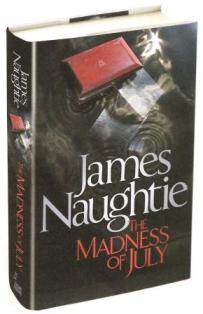
James Naughtie, of Radio 4 fame, has made no secret in the past of his fondness for crime fiction – particularly Scottish crime writing – so it will be fascinating to see how he tackles what appears to be a spy thriller set in the 1970s in The Madness of July, from Head of Zeus.
Iconic Overdrive
I know I use the terms ‘iconic’ and ‘legend’ far too much, but I have no hesitation in applying both terms to that legendary fictional secret agent and iconic character David Callan, created in 1967 by James Mitchell. First in a television play, then in a long-running series, a film, five novels and over a dozen short stories, Callan was the very antithesis of the extravagances of James Bond. Dour, ferociously downbeat and hard as nails, Callan was the ultimate blunt instrument working for an off-the-books assassination department of British intelligence. He had one friend, a fellow jailbird called, ironically, Lonely, as there never was a lonelier hero than Callan himself.
For five years (1967-72) Callan the TV series starring Edward Woodward (and it is impossible to think of anyone else in the role) was compulsive viewing in Britain, attracting viewing figures which today’s TV executives would kill for.
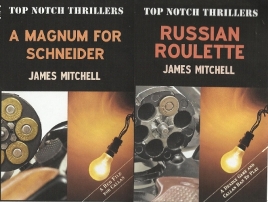
Recently, the TV series were released on DVD and now the first two novels featuring Callan - A Magnum for Schneider (the original title from 1969, though a paperback edition was retitled Red File for Callan) and Russian Roulette from 1973 - have been republished (and as eBooks for the first time) as Top Notch Thrillers by Ostara Publishing. Further information and a feature on the author can be found at http://www.ostarapublishing.co.uk/article-136.html.
The Annual Cull
As the nights draw in, the annual cull of books from the numerous libraries here in Ripster Hall takes place in order to make room for next year’s intake.
 
Now that great age and infirmity have overtaken me, I am reduced to a purely supervisory role when it comes to offering those volumes surplus to requirements to the local villagers – at very reasonable prices. Consequently I am indebted to the many tenants of the estate, ably assisted by volunteers from the Parachute Regiment (normally responsible for security at the Hall), who did all the heavy lifting.
Pip! Pip!
The Ripster
|